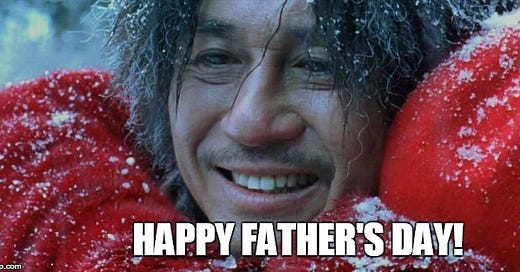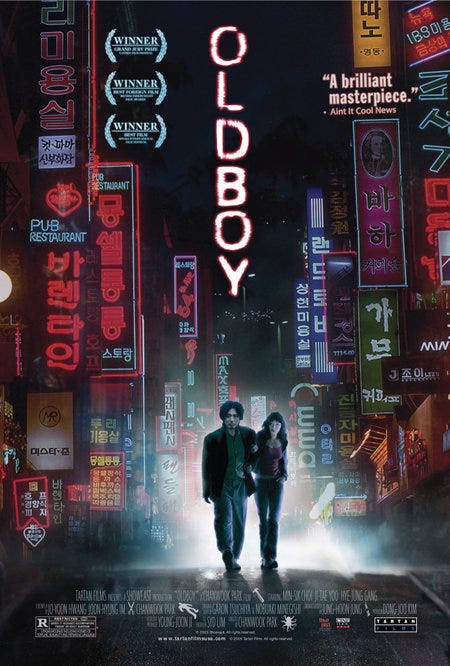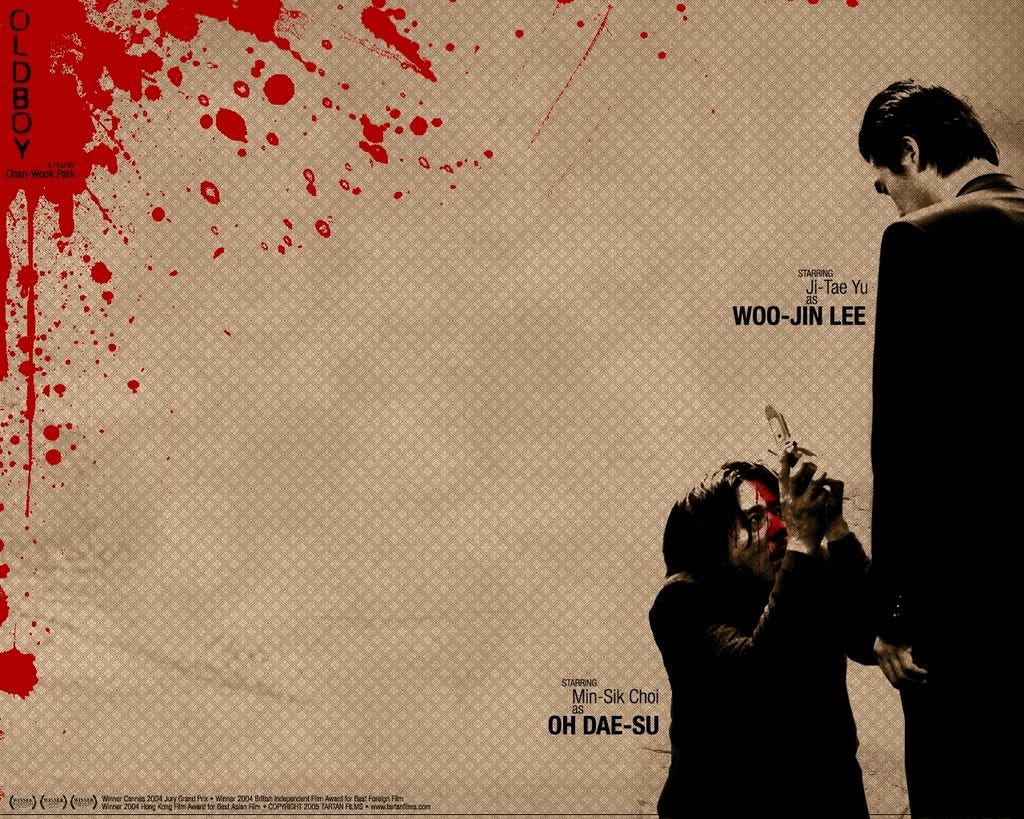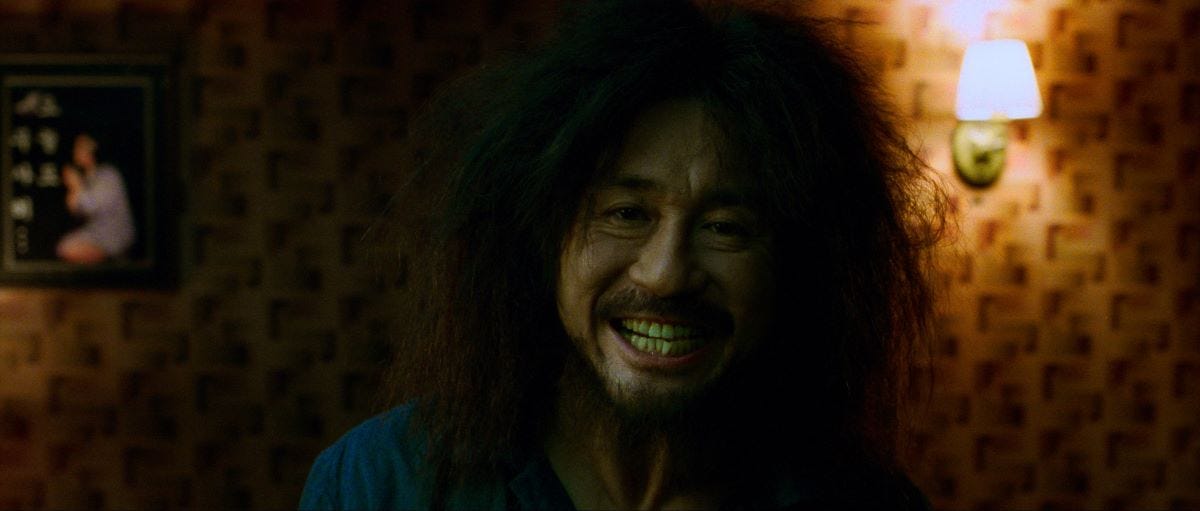If you’ve ever seen this movie, you know what an absolute trip it is. It starts out unassuming enough with Oh Dae-su (Choi Min-sik) being very obviously inebriated and detained by the cops. He dons a present for his daughter, white wings, and dances around the police station and is an overall nuisance until we slam into his cell with him.
Good! Sober up, stop being a menace-to-society, move along.
Except.
Except it’s not a prison, not in the same sense we’re used to seeing, with steel bars and warden’s leery eyes around every corner. This looks like a hotel room with a seedy bed, unassuming wallpaper, and ugly mustard carpet.
No logic. No time. Just…hell.
Dae-su is trapped here for 15 years. A staticky TV for company and a paltry diet of potstickers day in and day out. Death isn’t even an option, medical professionals intervening if you try too hard to escape the physical realm.
This room, Dae-su eventually learns, is a personal prison, where others can pay to have their enemies imprisoned for a fee, and Dae-su just so happens to have landed himself in here for “talking too much.”
Which honestly makes no sense and even as we progress through the movie and witness the flashback that forces the catalyst for Dae-su’s torment, is a shit hole of a reason.
Taking place in Seoul and a commentary on the social inequity in South Korea, director Park Chan-wook moves Dae-su through the underbelly of the city on a violent streak of vengeance to understand just why he was put through this torture.
It’s not a good reason, in fact, it’s a real:
Tragedy About Family
As beautifully chaotic and violent as Oldboy is, the amazing fight scene choreography and the comedic timing of it all, this movie is absolutely a tragedy.
Two men, hellbent on revenge.
Money speaking louder than the government.
Bodies littering the ground of a feud with no basis and the logic of hate ruining lives.
There is no forgiveness, there is no salvation; any success is a failure.
For Dae-su, he wants answers. He wants to get laid. And he wants to get revenge. Not necessarily in that order, but whichever ingot comes to be stricken first.
For Woo-Jin Lee (Yoo Ji-Tae), he wants to make Dae-su suffer. To suffer mentally, physically, and emotionally, to feel all the pain he felt and still feels because Dae-su saw something he shouldn’t have as a student years and years ago.
Every relationship here is a tragedy, both families utterly ruined and eviscerated. Every love filtering through a hellhole of disgust and impropriety. Every reveal creating confusion and fear.
Yet the real tragedy is the knowledge we keep.
To know is to suffer.
To know is to suffer.
The more we learn, the more we cringe with the mounting horror of what we have just witnessed. Even we, as the audience, cannot escape the disgust and outrage the characters are experiencing.
The torture scenes, the bloody battles against Lee’s henchmen, Dae-su eating a raw octopus. Unsettling, cursed images that add to the overall feel of not-belonging. We are held in that tension just as they are and at the very end, when we watch Dae-su come out of hypnosis in the snow, as he makes eye contact with the lens and smiles, a silent, body-shaking laugh, we have to ask:
What do we know?
Below there will be major spoilers. Proceed at your own risk.
A Greek Play
Narratively, Oldboy is a Greek tragedy.
Specifically, he is Oedipus Rex, originally written by the Greek poet Sophocles, rehashed in 2003 to similar tragic beats in South Korea.
Oedipus has the great misfortune of being prophesized to kill his father and marry his mother. One cannot outwit the gods, so every attempt to avoid this fate thrusts it upon Oedipus and his family, his hubris ultimately slamming the final nail into his coffin.
Oh Dae-su = Oedipus.
I also did not catch that on first watch, but as soon as you make the connection, all the misaligned story pieces fall into place.
Dae-su having sex with his daughter, Mi-do (Kang Hye-jeong) is this version’s prophecy of Oedipus sleeping with his mother, Jocasta.
We can make an argument that like Oedpius, Dae-su’s hubris is the key to his downfall, but in Park Chan-wook’s vengeance series (Sympathy for Mr. Vengeance-2002, Oldboy-2003, Lady Vengeance-2005), wrath and lust play pivotal parts, and revenge takes the crown for greatest motivation for each of their characters.
Ripped from his existence and forced to trek back into what should have been familiar territory. Fighting bandits and winning, continuing out on his journey into finding himself. Fighting Woo-jin Lee (an unreasonable prophecy) and losing. In every sense of the word.
The realization of the incestuous things he has done and his self admonishment in the snow. The 40 steps leading away that leaves us with more questions than answers and the sinking feeling that Oh Dae-su, like us, has to live with the consequences of his actions.
He cannot punish himself enough. That is written in the stars. To suffer at his own hand, to punish himself and live through that and go on the rest of his days with that damnable knowledge.
Oldboy doesn’t follow Oedipus beat for beat.
But Director Park presents enough elements of the original tale so that no matter how you slice it, you cannot help but see this as the pinnacle of human suffering.
What a tragedy.








